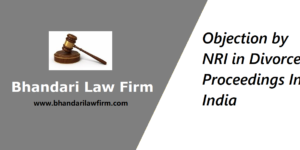Family Courts In India Family court lawyers in Chandigarh Mohali
India is a land of diversified culture, local customs and various conventions which are not in opposition to the statue or ethics. People of different religions as well as traditions are regulated by all the different sets of personal laws in order to relate to family affairs. With the high number of married persons, marital disputes also increase due to various reasons and the majority come to the court for redressal. Family courts have a very crucial role to play in reducing the load of disputes on an overburdened judicial system, providing relief to litigants, who are forced to suffer prolonged delays in getting justice. Family court Lawyers in Chandigarh Mohali
“Right is right, even if everyone is against it, and wrong is wrong, even if everyone is for it.” – William Penn
Family Court Family court Lawyers in Chandigarh Mohali
Family has been regarded as the most important and basic constituent of society. There are a number of judicial provisions dealing with marriage and its various aspects. The need to establish the Family Courts was first emphasized by the late Smt. Durga Deshmukh. In fact,then made a proposal to set up Family Courts in India to Prime Minister Pt. Jawahar Lal Nehru.
The formation of family court was a mile stone in the history of Indian judiciary. The Family Courts Act 1984 established the creation of Family Courts through a Gazette notification by the Central Government. These courts are to be established in a town or city where the population exceeds one million or in any area where the State Government considers to establish it. One or more judges constitute the Family Courts but each judge is competent to exercise all the powers of the court. The recommendation of the Law Commission in its 59th report also gave further impetus to the establishment of Family Courts. After several vacillations the Family Courts Act 1984 was ultimately passed. Family court Lawyers in Chandigarh Mohali
What Are Family Courts in India Family court Lawyers in Chandigarh Mohali
Family Courts are specialised type of courts entrusted with the disposal of cases concerning disputes relating to the family. These courts deal with litigation concerning marriage, divorce, maintenance, guardianship, and the property of the spouses. The environment of family courts is expected to be different from regular courts. The atmosphere is supposed to be quite informal and relaxed. Referring to the legal provision;
The Family Courts Act, 1984 Family court Lawyers in Chandigarh Mohali
This act provides for establishment of Family Courts by the State Governments in consultation with the High Courts with a view to promote conciliation and secure speedy settlement of disputes relating to marriage and family affairs and fir matters connected therewith.
Under Section3(1)(a) of the Family Courts Act, it is mandatory for the State Government to set up a Family Court for every area in the State comprising city or a town whose population exceeds one million. In other the States, the Family Courts maybe set up if the State Governments deem fit it necessary.
Objective Of Family Courts Family court Lawyers in Chandigarh Mohali
The basic purpose of the Family Courts as embodied in the preamble to the Family Courts Act is –
- To promote conciliation in, and secure speedy settlement of disputes relating to marriage and family affairs and matters connected therewith. Family court Lawyers in Chandigarh Mohali
Establishment Of Family Courts Family court Lawyers in Chandigarh Mohali
Section 3 of the Family Courts Act, 1984, deals the establishment of family courts. The statements of the Act provide the brief details of the establishment of family courts.
1.For the purpose of exercising the jurisdiction and powers conferred on a family court by this Act, the State Government, after consultation with the High Courts, and by notification.
- Shall, as soon as may be after the commencement of this Act, establish in any area in the state comprising city or town where the population exceeds one million, a family court.
- May establish family courts for such other areas in the state as it may deem necessary.
Criteria Of Appointment Of Judges Family court Lawyers in Chandigarh Mohali
According to section 4, while appointing a judge for family court preference should be given to women and requirement of following qualifications: Family court Lawyers in Chandigarh Mohali
- a person should have either seven years’ experience as a Judicial officer in India or office of a Member of a Tribunal or any post under the Union or a State requiring special knowledge of law or practised in High Court or two or more such courts in succession for seven years or qualifications asked by Central Government in consultation with Chief Justice of India.
- must be less than sixty-two years.
- is devoted to protecting and preserving: the institution of marriage, welfare of children and conciliation and counselling as techniques for settling disputes
Legal Jurisdiction Of Family Law Courts Family court Lawyers in Chandigarh Mohali
The legal jurisdiction of Family Courts extends to all matters that pertain to matrimonial issues, maintenance, alimony and custody of children in a marital dispute or a divorce. Further, Family Courts deal with the following:
- Suits or proceedings between parties to a marriage for a decree of restitution of conjugal rights, judicial separation, nullity of marriage or divorce.
- Maintenance related issues.
- For an order of injunction in certain circumstances arising in a matrimonial relationship.
- For declaring legitimacy of any person.
- Suits or proceedings between parties regarding dispute about the property.
- Guardianship or custody of any minor or child.
Functions Of Family Court; Family court Lawyers in Chandigarh Mohali
The Family Courts are free to evolve their own rules of procedure, and once a Family Court does so, the rules so framed override the rules of procedure contemplated under the Code of Civil Procedure
Special emphasis is put on settling the disputes by mediation and conciliation. This ensures that the matter is solved by an agreement between both the parties and reduces the chances of any further conflict. The aim is to give priority to mutual agreement over the usual process of adjudication. In short, the aim of these courts is to form a congenial atmosphere where family disputes are resolved amicably. The cases are kept away from the trappings of a formal legal system.
The Act stipulates that a party is not entitled to be represented by a lawyer without the express permission of the Court. Family court Lawyers in Chandigarh Mohali
Appeals (Section 19)
An appeal lies from a judgement of Family Court, not being an interlocutory order or an order passed with the consent of the parties or an order passed by the Family Court under section 125 of Carps (Family Courts (Amendment) Act, 19911, to the High Court. The appeal can lie both on facts and on law. The appeal must be preferred within a period of thirty days from the date of judgement or order of the Family Court. Besides this, if a party is late in filing an appeal by reason of sufficient cause, the Appellate Court may excuse the delay under the Limitation Act, 1963. Family court Lawyers in Chandigarh Mohali
Family Courts In India: Present Position
As per the reports received from the State Governments, 535 Family Courts are functional in the country on 31st December, 2018.
In order to achieve the aims and objectives of the Family Courts Act, 1984, dedicated Family Courts have been setup under the jurisdiction of Punjab and Haryana High Court. At present, there are 10 Family Courts in Haryana (8 Districts) and 5 Family Courts in Punjab. So as to refer the judgments given by the family on various issues;
Balram Yadav vs Fulmaniya Yadav (AIR2016 SC 2161)Over riding effect of Family Courts Act over other laws. Under Section 7(1) Explanation (b), a Suit or a proceeding for a declaration as to the validity of both marriage and matrimonial status of a person is within the exclusive jurisdiction of the Family Court, since under section 8, all those jurisdictions covered under Section 7 are excluded from the purview of the jurisdiction of the Civil Courts.
(Click Here To Know About Of Matrimonial and Family Court Litigation)
Bhawan Mohan Singh Vs Meena and others; (2015) 6 SCC 353) Maintenance Section 125 Crpc. Whether the Family Court while deciding an application under Section 7 of the Family Court Act, should allow adjournments in an extremely liberal manner
Held –Family Courts have been established for adopting and facilitating the conciliation procedure and to deal with family disputes in a speedy and expeditious manner.
Further held –Family judges are expected to be sensitive to the issue pertaining to the marriage and issues ancillary thereto. Family judge should remember that procrastination is the greatest assassin of the list before it.
Custody of minor child –Hindu Minority and Guardianship Act, 1956, Section 13 –Paramount Consideration –Welfare and custody of the child and not rights of the parents under a statute –Each case has to be decided on its own facts and other decided cases can hardly serve as binding precedents in so far as the factual aspects of the case are concerned (Para 14). Mausami Moitra Ganguli Vs Jayant Ganguli, (2008 (4) RCR (Civil) 551(SC).
Conclusion
There are different personal and special matrimonial laws in force covering matrimonial and allied matters. The family court has jurisdiction to settle the disputes under all these enactments. Thus, the Family Court Act is only a procedural statue. Hence the Act does not override personal laws, but provides an alternative adjudication forum of dispute resolution. The Family Court Act has to have its desired effect across the country to resolve family disputes in a harmonious fashion, then there is much that needs to be done with regard to the training, roles and responsibilities of the counsellors serving in the various Family Courts in the country.
Author: This article was written by Ishmeet Kaur, B.A. LLB, student of Government Mohindra Collage, Patiala.
Note: For any further information or any query you may contact us on 9855677966 or via email info@bhandarilawfirm.com



